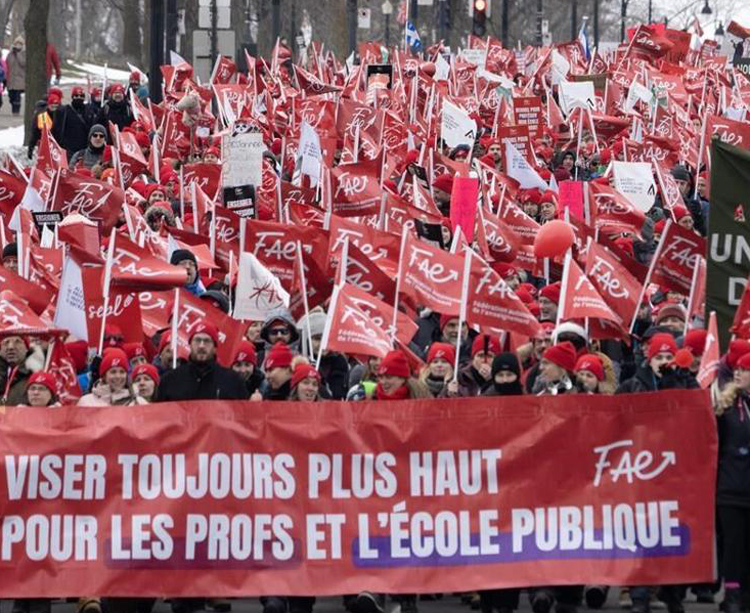MONTREAL — Under the pressure of a lively five-week strike by 66,000 primary and secondary school teachers — members of the Autonomous Federation of Education (FAE) — and the threat of a strike in early 2024 by the Common Front of four union federations representing 420,000 additional teachers, health care and other public sector workers, the Quebec government signed tentative agreements with the unions Dec. 28.
The proposed contracts will be voted on by union members in weeks to come at union meetings where they will see the agreements.
Another 80,000 public workers, members of the Interprofessional Health Federation of Quebec (FIQ), mostly nurses, are still negotiating with the government.
Both the FIQ and the Common Front had organized a series of short strikes that at times overlapped both with each other and the ongoing FAE strike. This meant that at times almost 600,000 public sector workers walked picket lines and marched in demonstrations together all across Quebec.
The workers, whose union contracts expired last March, have been fighting for wage increases to catch up with inflation, protect them against future price rises, and to improve their standard of living. They demanded an end to intolerable working conditions generated by the worsening crisis in Quebec’s education and health care systems, decades in the making. It’s a result of government spending cutbacks and a series of anti-working-class “reforms.”
In a failed attempt to turn the population against the workers, Quebec Premier Francois Legault blamed the unions for the deplorable conditions in the schools and hospitals. He charged that “for decades we have failed to improve education and health services, much because of the rigidity of collective agreements. It’s not right that our network be managed by unions rather than by managers.”
Striking teachers set the pace
The FAE strikers had been at the forefront of the fight, picketing daily and calling a series of mass demonstrations, including a march of many thousands through Montreal as their strike began.
Hundreds of FAE strikers mobilized Dec. 21 to block the truck entrances to the major ports of Montreal and Quebec City, shutting them down for two hours. Their goal was to press the Legault government to negotiate seriously.
“I came here to encourage the teachers,” parent and retired teacher Benoit Mathieu told one Militant worker-correspondent at a Dec. 22 strike organized rally. “The rich continue to get richer, and the poor continue to get poorer. I have been here for 50 years, and I no longer recognize the Quebec to which I immigrated.”
“We are angry,” said Montreal teacher Angelina Glom. “We are fighting for the future.”
“The government has no respect for young people or for teachers,” secondary school teacher Jean-Nicolas Gagnon told the Militant. “In 2018 they said they would prioritize education, but that’s not true.”
The militant actions by the strikers won the support of millions of working people across the province. Solidarity came from other unions including the United Steelworkers, Unifor, and the Public Service Alliance of Canada — the federal government workers’ union. Together these unions donated 272,000 Canadian dollars ($205,350) in funds and grocery gift cards to help FAE strikers in need. Lacking a union strike fund, they received no strike pay.
Social crisis in Quebec
In the seven days leading up to Dec. 11, 32% of hospital emergency room patients in Quebec spent more than 24 hours waiting on a stretcher before receiving any care.
This year the Quebec government admitted the school system was short 5,000 teachers. The education minister promised parents there would be “one adult” in every class, but couldn’t ensure they would have any teacher training or a degree.
Further revealing its disdain for the working class, the Legault government Dec. 9 rammed two pieces of legislation through the National Assembly, “restructuring” down the education and health care systems in the name of “more efficiency.”
In this context, many parents organized to back the striking teachers, despite facing the challenge of organizing day-to-day life with their children out of school for weeks.
“You can’t change things without fighting for them,” Hacene Megouli, a parent with three children, one of school age, told the Militant at a Dec. 20 parent-organized picket and solidarity potluck lunch held on the lawn of the Ecole des Monarques primary school in Montreal. “This strike is for the education system, and this is why parents are supporting it. In unity there is strength — parents, and teachers together.”


